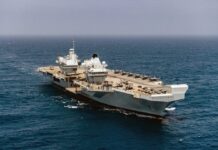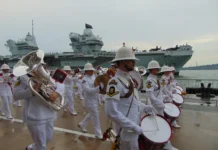Eulogy for Kit Morgan (29 June 1951 – 11 October 2024) by Rear Admiral Simon Cullen
By ANI President Pete Leavy
It is with deep sadness that I report the passing of long-standing ANI member, Lieutenant Commander Kit Morgan, who died on 11 October 2024 after a short illness. Kit’s five-decade contribution to Australia’s maritime capability, both in uniform and industry, was remarkable. I had the privilege of experiencing his leadership firsthand when he served as Executive Officer during the commissioning of HMAS Westralia in 1989, where we spent three memorable months together in the UK preparing the ship for service.
Kit’s naval career began in 1970, where he trained first as a submariner and later as a navigation specialist. His final sea posting as XO Westralia and he soon transitioned to what would become an equally impressive 30-year career in the Defence industry sector.
What truly set Kit apart was his extraordinary ability to connect with people. It speaks volumes about his character that he maintained connections with his Phase 4 trainee officers (like me) even 35 years later. Until earlier this year, we were still sharing conversations during bike rides around Lake Burley Griffin, making his unexpected loss particularly poignant.
The following eulogy, delivered at Kit’s memorial service by RADM Simon Cullen, captures the essence of a man whose impact on the Royal Australian Navy, Defence industry, and the lives of those he touched will be deeply missed and long remembered:
Good afternoon, I would like to thank the family for the opportunity to say a few words about Kit’s naval and business career. I had the great pleasure of knowing Kit Morgan for nearly 40 years.
I knew Kit as both a naval officer and industry leader, but above all as a friend. We used to ride our bikes together around Lake Burley Griffin, discussing the news of the day, the state of defence and defence industry, occasionally politics and cricket, and above all rugby. I mention these topics because many here today would have had very similar conversations with Kit, who assiduously maintained a strong network of friends and colleagues throughout his life.
Kit Morgan was a man of remarkable character, unwavering dedication, and great talent who left an indelible mark on the Royal Australian Navy and Australian Defence industry. His life’s journey, spanning over five decades of service to his country, was one of continuous growth, leadership, and profound impact.
Naval Career
Kit’s naval career began in 1970 as a Seaman Officer in the Royal Australian Navy and lasted 21 years. He qualified as a submariner before becoming a proficient navigator in the surface fleet. He saw operational service in Vietnam and as a submariner.
In 1984 Kit was one of the lucky individuals selected to be part of the commissioning crew of HMAS Darwin, a guided missile frigate, which was nearing completion in a shipyard in Seattle. As the Navigator, part of Kit’s role was to liaise with US Navy staff about where the ship would go for trials and for official and other visits on the west coast of the US and Canada. Little did the captain know that, when organising port visits, Kit frequently had an underlying driver for determining which ports were suitable – rugby.
Shortly after joining Darwin, Kit started sounding out likely crew members about who was interested in forming a ship’s rugby team. Within a short space of time, he had more than a quorum and playing positions were worked out. Shortly afterwards Kit announced that the ship had been challenged to a game by the Vancouver Trojans the following weekend and the team set off for the drive to Vancouver, not having done any team training. Needless to say, the team was soundly beaten. This was a salutary lesson for the team and Kit got them into training so that, in the many games played subsequently, they more than held their own with many wins. The lesson dished out by the Vancouver Trojans was used by Kit as a motivator. He even had a scrum machine knocked up by the shipwrights so the team could train when the ship was at sea.
18 months later, on her way home to Australia, the ship visited Vancouver as part of the Canadian Navy’s 75th anniversary celebrations. In advance of the visit, Kit threw out a challenge to the Vancouver Trojans who, initially, were only prepared to play their B or C teams. Kit worked his magic, and they agreed to field their A side. Revenge was sweet – albeit by a narrow margin.
Kit and his rugby team were a major source of pride for the ship. He is well remembered by the commissioning crew for his passion and post-rugby exploits. Over sixty of that crew have offered their condolences on the Commissioning Crew Facebook page.
In 1987 Kit and I crossed paths at sea off Fiji, soon after the first coup in that country. Kit was the Navigating and Operations Officer of HMAS Stalwart which was designated at the time as the Naval Task Group Commander. Stalwart was being overwhelmed with the amount of message traffic and planning responsibilities and I was loaned from HMAS Sydney to Stalwart to help. Kit and I immediately struck up a strong working relationship as we shared the workload and got things organised. We were quickly able to demonstrate to the rather strong willed and impulsive ship’s captain at the time that we had things under control!
Following his posting to Stalwart, Kit served as Fleet Navigator, responsible for maintaining navigation standards across the whole fleet. His last sea posting was as the commissioning Executive Officer of HMAS Westralia, a ship that was purchased from the United Kingdom.
Throughout his naval career, Kit was a pleasure to serve with, being an excellent mess mate as well as a strong contributor to unit operational effectiveness. Apart from being a thorough professional, he was always concerned about the welfare of his sailors. He was highly respected by all for his positive leadership.
Defence Industry Leadership
Kit did not see himself spending his whole working life in the navy and carefully planned his transition to defence industry, choosing to work initially with someone he knew well. His first role was with STN ATLAS as the company’s Canberra Representative. During this time, he became associated with senior executives of the various business divisions of the German parent company whom he met, briefed, and escorted during their Canberra visits. The wide scope and professionalism of his representative activities on behalf of the company impressed these senior executives and would be a feature of his future business career.
Kit always described his time at STN Atlas as the period where he learned how business worked, where he learned to understand a balance sheet and how to succeed. After about 10 years with ATLAS, Kit joined the telecommunications company Ericsson where he worked for another 10 years.
Kit really enjoyed his time with Ericsson. He was very good at grasping the potential application of new technologies. One retired senior officer remembers chatting to him around 2001 and he was describing a new technology Ericsson had developed called Bluetooth and what a big impact he thought it would have in telecommunications. How right he was!
Kit’s career in defence industry lasted over 30 years. He also worked for:
ThyssenKrupp, UGL and KBR.
During his business career, Kit demonstrated an exceptional ability to elevate company profiles, forge strategic partnerships, and lead major Defence projects.
He was a particularly good judge of character and a great sounding board for senior executives.
He knew what was right, the right way to treat people, and the right way to conduct oneself. He had an innate ability to talk with and relate to anyone – no matter their position from the most senior to the most junior – it did not matter; Kit was the same person irrespective.
Community Involvement and Personal Life
In the community, Kit was a staunch member of the Lords Taverners charity. As a committee member for a decade and Vice President for five years, he contributed strongly to all that was being done to help the young and disadvantaged play sports of their choice. He brought his significant networking energy to the organisation, helping boost attendance at charity events and introducing new members, several of whom served on the Committee. In his committee roles he brought to bear his post-Navy business experience, always stressing the need to define and improve the ‘value offering’ for members.
Legacy
In conclusion, Kit Morgan’s life was characterised by professionalism, integrity, and a commitment to excellence. His ability to forge strong relationships, mentor others, and contribute meaningfully to his professional field and community leaves a legacy. Kit’s impact on the Navy, Defence Industry, and the lives of those he touched will be remembered and cherished for years to come.
As we bid farewell to Kit Morgan, we celebrate a life well-lived—a life of service, leadership, and passion. His journey from a young naval officer to a respected industry leader and community contributor inspires us all. Kit’s memory will continue to guide and inspire those who had the privilege of knowing him, working alongside him, or benefiting from his wisdom and generosity.
May he rest in peace.


